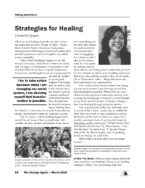Discussing Race in the Adult Education Classroom: Dalsaint Shares His Story
November 1st, 2021 | Blogs
This is the first installment of a blog series from The Change Agent featuring adult education students sharing how talking about race in their programs has helped them navigate their lives differently.
A note of thanks goes to Riva Pearson for conducting the interview below.
Over the past year, people and communities have made discussing race a visible priority. Topics concerning Black Lives Matter, George Floyd, and protests were among some of the most searched topics in 2020.(1) In the adult education field, a need arose for professionals to have access to additional resources and support to address these topics with students, as students themselves expressed a desire to discuss their concerns about racism and police brutality.
At World Education’s Addressing Racial Equity in our Adult Education Classrooms, Programs, and the Field webinar series in April, attendees were drawn in by student’s testimonials on discussing racism in their programs. One student, Dalsaint Lavoir, an English for Speakers of Other Languages student at Jewish Vocational Services (JVS) in Boston, noted the ways in which talking about race with his instructors and peers helped him navigate his life in the United States.
As an immigrant, it helped us to be more careful and learn how to prevent some issues. When you come here and you don’t know how to deal with… those situations, you could be a victim.
“It’s the reason why the students want to learn more about this topic, because we live here and would like to see a better country… where our community is safe and [we] feel confident… that we live in a safe place without fear and without pain.”
For Dalsaint, it was shocking and painful to see images of police brutality and anti-blackness in the media, particularly because it challenged his previous perception of America as a place of opportunity. Recounting viewing footage of the detainment and assault of army Lt. Caron Nazario during a traffic stop (2): “… it’s unbelievable. I wonder [to] myself… that’s America? What happened?”
Despite these feelings and the difficulty of confronting them, Dalsaint stressed the importance of becoming educated on civil rights and continuing to have these conversations in the classroom. He gives credit to his teacher at JVS, Riva Pearson, “You gave us advice on how to handle those situations, laws [about] how to deal with police officers, and you let us know our rights. That was helpful.” See the lesson Riva developed called “Talking to the Police.”
 At a Distance Education Strategy webinar in July of 2020, Riva Pearson talked about what led her to address race in the classroom in a more effective way, and how doing so enabled her to equip her students with tools to help them process the things they were reading and seeing.
At a Distance Education Strategy webinar in July of 2020, Riva Pearson talked about what led her to address race in the classroom in a more effective way, and how doing so enabled her to equip her students with tools to help them process the things they were reading and seeing.
“Several students had seen the video of George Floyd and were feeling a lot of fear and stress, and so I posted this article from the Talking About Race issue of The Change Agent about healing from racism, and we’d read it before but it became much more personally relevant to them. So, we went back to it to give them some strategies to deal with their stress.”
As author Elizabeth Nguyen writes in the aforementioned article titled “Strategies for Healing”: “I try to take action because when I am changing our racist system, I am showing myself that transformation is possible.” (3)
Don’t give up. Don’t be discouraged from doing the right thing.
Dalsaint echoed this messaging on the importance of taking action, including through voting. He notes that while barriers such as gerrymandering and voter suppression are rampant, voting is still our “nuclear weapon,” and that activism is one of the most important tools people have to have an impact. “I saw [on] tv last year people protesting around this country. It’s a great way to fight back but without violence. That’s the best strategy, to make your voice heard.”
References
World Education strives to build lasting relationships with partners across diverse geographic regions and technical sectors to produce better education outcomes for all.